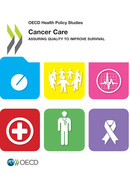New OECD publication evaluates cancer care and survival of cancer patients
On 30 October 2013, OECD published “Cancer Care” [1] as a summary of indicators for care provided to cancer patients in participating countries. According to the attached “country note” for the Czech Republic [2], cancer outcomes could be further improved, despite recent improvements in survival rates of cancer patients. Estimated 5-year survival rates for selected cancers are lower than the OECD average, and mortality rates are generally high, as a result of high cancer incidence rates among the Czech population, and a relatively late diagnosis.
 OECD experts noticed that the Czech cancer care system has been strengthened in recent years with the emphasis on clinical guideline development, quality assurance, and health information infrastructure, but the country should further focus on the following areas:
OECD experts noticed that the Czech cancer care system has been strengthened in recent years with the emphasis on clinical guideline development, quality assurance, and health information infrastructure, but the country should further focus on the following areas:
Promoting prevention and healthy lifestyles
One in four adults (24.6%) smoked daily in 2008, and smoking rates have actually increased in the past decades in the Czech Republic. Smoking rates among 15-year-olds are alarming: 28% of children smoked at least once a week in 2009–2010, which is the highest rate in the OECD after Austria. These figures have placed the Czech Republic to a rather eccentric position when compared to an overwhelming majority of other developed countries.
In the Czech Republic, cancer incidence is at 288.5 per 100,000 population, high above the OECD average of 260.9 in 2008, and risk factors are increasing (adult obesity is 21.0%, again above the OECD average of 17.6% in 2011). Therefore, a comprehensive approach is needed to reduce risk factors for cancer and improve lifestyles, involving all stakeholders such as industry, the entire population (including children and their parents), and health care providers including primary care doctors. For example, some countries have enhanced the role of GPs to promote prevention, sometimes through financial incentives.
Improving the availability of new drug treatments
OECD experts also stated that the authorisation of new drugs is much slower compared with other OECD countries, and that the availability of such treatments is not stable over years as it depends on the negotiation between insurance companies and associations of providers (or providers themselves). In order to ensure a more secure access to new drug treatments, the country could learn from separate financing arrangements developed for innovative pharmaceuticals in other countries. For example, in Australia, separate funding became available for selected innovative drugs, and a similar arrangement is available in France. In Germany, cancer drugs are paid on a DRG basis or through “specific additional payments”, and DRG and additional payment levels are updated every year by the National Institute for Payment in Hospitals.
Strengthening feedback mechanisms
In their report, the panel of OECD experts stated that the Czech Society for Oncology monitors and evaluates the effectiveness of key treatment, but the country should strengthen the feedback mechanisms to promote best practices in cancer diagnosis and treatment among providers. The Czech Republic should also undertake systematic reviews as done in the Netherlands and some health care organisations in the United States. In the latter, health systems like Intermountain Health and Kaiser Permanente have robust systems of assessment and feedback. Public reporting is also important to promote provider accountability and patient-centred care delivery. Such concept of quality assessment of health care providers does not exist in the Czech Republic.
Strengthening effective health care interventions, cancer screening in particular
According to OECD, early diagnosis is the most important prerequisite for an improvement in cancer survival rates. Carefully organised and high-quality cancer screening programmes are therefore among its key recommendations. Like other developed countries, the Czech Republic provides three cancer screening programmes to its citizens (more information is available at www.mamo.cz, www.kolorektum.cz, www.cervix.cz). For the time being, the Czech Republic has not yet fulfilled the recommendation by the Council of the European Union, the European Commission and the International Agency for Research on Cancer, as it does not provide the so-called population-based cancer screening programmes, which require personalised invitations of citizens to screening, accompanied with a highly advanced data background with a comprehensive system of quality assurance (see Note). The OECD report states that strong political and legislative support is needed for the implementation of population-based cancer screening programmes and their evaluation. Moreover, data linkages between population registries (notably between cancer and screening registries) would substantially strengthen monitoring of cancer screening programmes, and would bring the Czech Republic closer to developed north- and west-European countries in terms of organisation of cancer screening programmes.
References
- Cancer Care: Assuring Quality to Improve Survival (OECD Publishing, 2013)
- Country note: Czech Republic (
 PDF file, 454 kB)
PDF file, 454 kB)
Note
- Population-based cancer screening programmes in the Czech Republic were launched in January 2014, i.e. after the OECD report had been published (2013). For more information, read the article Personalised invitations of Czech citizens to cancer screening programmes.
Zdroj: Tisková zpráva Ústavu zdravotnických informací a statistiky ČR a České onkologické společnosti ČLS JEP
21. 11. 2013 IBA MU



